September 15th, 2025
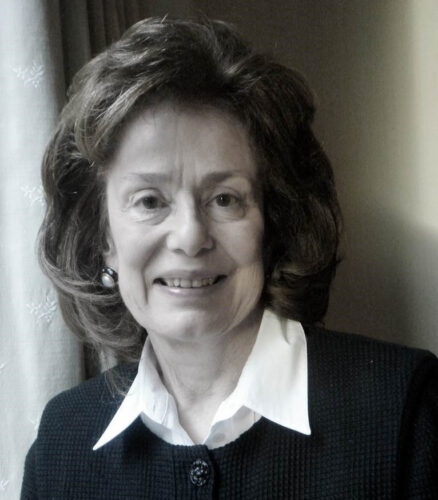 Biographers International Organization (BIO) is pleased to announce that Kate Medina is the 2025 recipient of the Editorial Excellence Award. Established in 2014, this annual award honors an editor for outstanding work in the service of biography and literature. Medina will be presented with the award Tuesday, October 7, at the New York Society Library in New York. Register HERE to attend, 6pm – 7:30pm at 53 E. 79th Street. The event is free but seating is limited and registration is required. Scheduled speakers will be Jonathan Darman, Andrea Elliott, Jon Meacham, and Evan Thomas.
Biographers International Organization (BIO) is pleased to announce that Kate Medina is the 2025 recipient of the Editorial Excellence Award. Established in 2014, this annual award honors an editor for outstanding work in the service of biography and literature. Medina will be presented with the award Tuesday, October 7, at the New York Society Library in New York. Register HERE to attend, 6pm – 7:30pm at 53 E. 79th Street. The event is free but seating is limited and registration is required. Scheduled speakers will be Jonathan Darman, Andrea Elliott, Jon Meacham, and Evan Thomas.
“The BIO Awards Committee is honored to present this year’s Editorial Excellence Award to Kate Medina, who recently retired from her position as Executive Vice President, Associate Publisher, and Executive Editorial Director at Random House,” says Committee Chair Heather Clark. “There, she edited Isabel Wilkerson, Jon Meacham, Gloria Steinem, Sandra Day O’Connor, Katherine Boo, Tom Brokaw, E. L. Doctorow, Emma Cline, Anna Quindlen, and Tracy Kidder, among many others.” Biographer Jon Meacham adds, “Henry James might well have had Kate in mind when he wrote that we should all strive to be someone on whom nothing is lost.”
According to Publishers Weekly, “Medina began her career in publishing at Doubleday, where she worked on the manuscript of Peter Benchley’s debut novel, Jaws, and acquired and edited Tennessee Williams’s Memoirs.” In 1985, Medina joined Random House, where she rose to become Executive Vice President, Associate Publisher, and Executive Editorial Director. Among the other authors she has worked with are John Dickerson, Jane Fonda, Tressie McMillan Cottom, David Finkel, Margaret MacMillan, Sally Bedell Smith, and Brenda Wineapple.
Authors Jonathan Darman, Andrea Elliott, Jon Meacham, and Evan Thomas will join Kate Medina in a discussion of Life Choices: The Art of Choosing the Subject for a Book: Writers, Editors, and the Biographical Journey.
Jonathan Darman is a journalist and historian who writes about American politics and the presidency. His books include Becoming FDR: The Personal Crisis that Made a President and Landslide: Lyndon Johnson and Ronald Reagan at the Dawn of a New America, which tells the story of a thousand transformative days in the 1960s through the eyes of two iconic American presidents. As a former national political correspondent for Newsweek, Jonathan covered the presidential campaigns of Hillary Clinton, John Kerry, and Mitt Romney. He wrote extensively about other significant figures in national politics and the media.
Andrea Elliott is a two-time Pulitzer-winning journalist, an investigative reporter for The New York Times, and the author of Invisible Child: Poverty, Survival & Hope in an American City, which won the 2022 Pulitzer Prize in General Nonfiction and was chosen by President Barack Obama as a favorite book of the year. Elliott is also the recipient of a 2007 Pulitzer Prize for feature writing, a George Polk Award, the J. Anthony Lukas Book Prize, Columbia University’s Medal for Excellence, and other honors. She is the first woman to win individual Pulitzer Prizes in Journalism and Arts & Letters.
Jon Meacham is a Pulitzer Prize–winning biographer. The author of the New York Times bestsellers Thomas Jefferson: The Art of Power; American Lion: Andrew Jackson in the White House; Franklin and Winston: An Intimate Portrait of an Epic Friendship; Destiny and Power: The American Odyssey of George Herbert Walker Bush; and His Truth Is Marching On: John Lewis and the Power of Hope, he holds the Carolyn T. and Robert M. Rogers Chair in the American Presidency at Vanderbilt University and is a fellow of the Society of American Historians.
Evan Thomas is the author of eleven books, including the New York Times bestsellers First: Sandra Day O’Connor, John Paul Jones, Sea of Thunder, and Being Nixon. His latest book, Road to Surrender, is an account of the dramatic final days of World War II, when Japan was reeling but would not accept defeat. Thomas was a writer, correspondent, and editor for thirty-three years at Time and Newsweek, including ten years as Washington bureau chief at Newsweek. He has appeared on numerous TV shows, including Meet the Press, CBS Morning News, Morning Joe, and The Colbert Report. Thomas has taught writing and journalism at Harvard and Princeton, where, from 2007 to 2014, he was the Ferris Professor of Journalism.
BIO’s Editorial Excellence Award has been presented since 2014. Past recipients are Michael Korda, Bob Bender, Tim Duggan, Robert Gottlieb, Gerald Howard, Gayatri Patnaik, Jonathan Segal, Ileene Smith, Nan A. Talese, and Robert Weil.
For further information regarding the Editorial Excellence Award and to schedule an interview with the Awards Committee Chair, Heather Clark, please contact BIO President, Steve Paul at president@biographersinternational.org.
 You can now register for Biography Lab 2026, BIO’s fourth annual online forum, which will take place via Zoom on Saturday, January 24, 2026. This event brings together biographers and publishing professionals for in-depth discussions on the craft and challenges of biography. It welcomes participants of all levels.
You can now register for Biography Lab 2026, BIO’s fourth annual online forum, which will take place via Zoom on Saturday, January 24, 2026. This event brings together biographers and publishing professionals for in-depth discussions on the craft and challenges of biography. It welcomes participants of all levels. 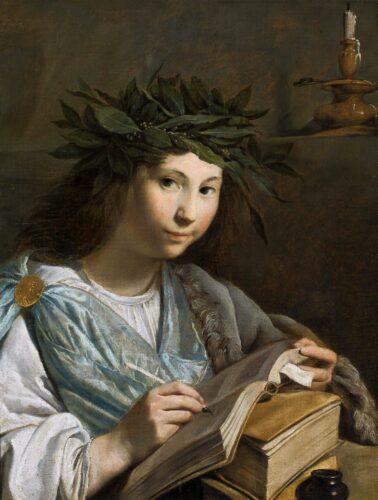
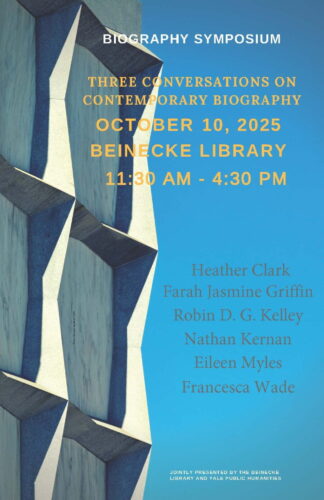 The Beinecke Rare Book and Manuscript Library at Yale University will host Three Conversations on Contemporary Biography on Friday, October 10, 2025, from 11:30 a.m. to 4:30 p.m. The symposium, presented in partnership with Yale Public Humanities, will feature leading voices in the field—including BIO Vice President Heather Clark—alongside Farah Jasmine Griffin, Robin D. G. Kelley, Nathan Kernan, Eileen Myles, and BIO member Francesca Wade.
The Beinecke Rare Book and Manuscript Library at Yale University will host Three Conversations on Contemporary Biography on Friday, October 10, 2025, from 11:30 a.m. to 4:30 p.m. The symposium, presented in partnership with Yale Public Humanities, will feature leading voices in the field—including BIO Vice President Heather Clark—alongside Farah Jasmine Griffin, Robin D. G. Kelley, Nathan Kernan, Eileen Myles, and BIO member Francesca Wade. Biographers International Organization (BIO) is pleased to announce that Kate Medina is the 2025 recipient of the Editorial Excellence Award. Established in 2014, this annual award honors an editor for outstanding work in the service of biography and literature. Medina will be presented with the award Tuesday, October 7, at the New York Society Library in New York. Register
Biographers International Organization (BIO) is pleased to announce that Kate Medina is the 2025 recipient of the Editorial Excellence Award. Established in 2014, this annual award honors an editor for outstanding work in the service of biography and literature. Medina will be presented with the award Tuesday, October 7, at the New York Society Library in New York. Register 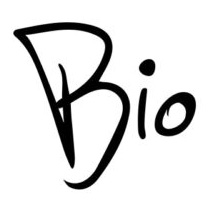 The 2026 BIO Conference is tentatively scheduled for May 28–29 in New York City, and the Conference Committee—co-chaired by Jared Stearns—invites members to submit panel proposals for consideration.
The 2026 BIO Conference is tentatively scheduled for May 28–29 in New York City, and the Conference Committee—co-chaired by Jared Stearns—invites members to submit panel proposals for consideration.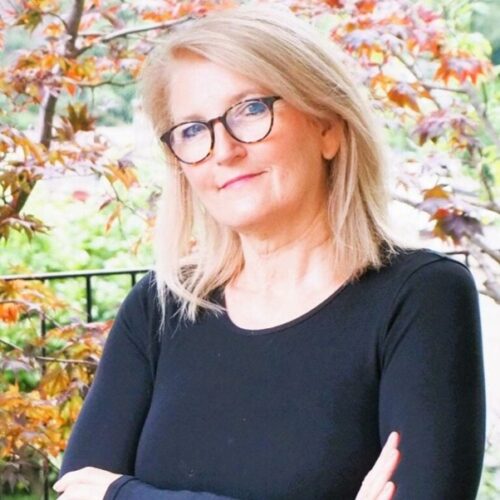 Valerie Waterhouse has been named the recipient of the inaugural Kitty Kelley Dissertation Fellowship for her research on Malachi Whitaker (1895–1976), a British working-class writer known for her short stories and memoir.
Valerie Waterhouse has been named the recipient of the inaugural Kitty Kelley Dissertation Fellowship for her research on Malachi Whitaker (1895–1976), a British working-class writer known for her short stories and memoir.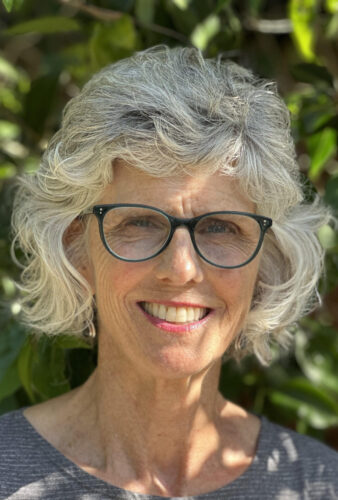 The 2025 Hazel Rowley Prize, honoring the best book proposal by a first-time biographer, has been awarded to Liz Schott, who is working on a biography of Dorothy Wright Liebes. Liebes was renowned for textile design, color artistry, and experimentation with innovative fibers from the mid-1930s until her death in 1972. She dominated women’s magazines, was featured in newsreels, television, and radio programs, and created the “Liebes Look,” a modern aesthetic we still embrace without even knowing her name.
The 2025 Hazel Rowley Prize, honoring the best book proposal by a first-time biographer, has been awarded to Liz Schott, who is working on a biography of Dorothy Wright Liebes. Liebes was renowned for textile design, color artistry, and experimentation with innovative fibers from the mid-1930s until her death in 1972. She dominated women’s magazines, was featured in newsreels, television, and radio programs, and created the “Liebes Look,” a modern aesthetic we still embrace without even knowing her name.